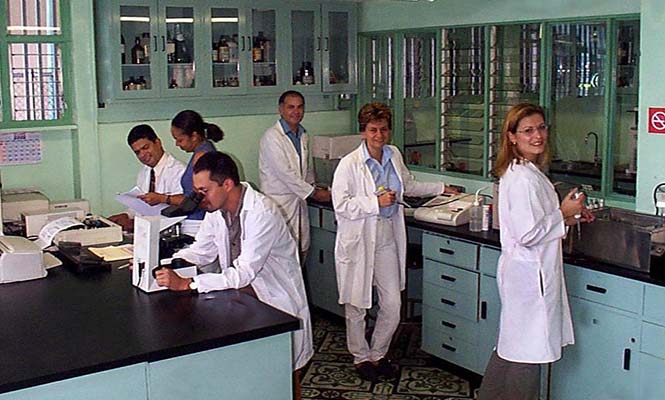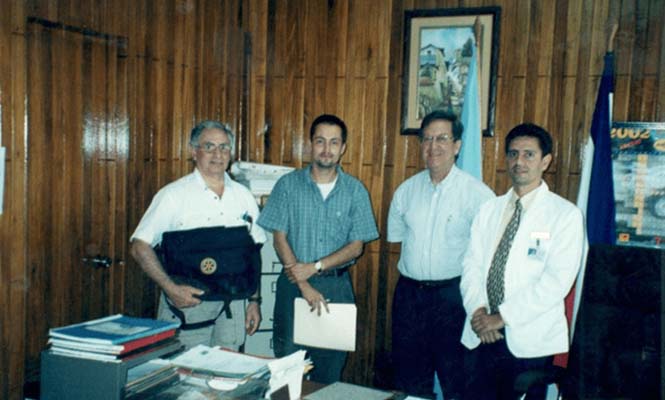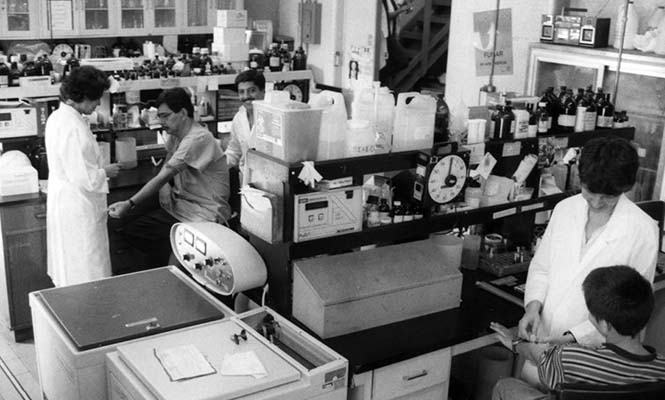Historical review
The CIHATA opened its doors in 1978 under the name of the Abnormal Hemoglobins and Related Disorders Research Center thanks to the boost and dedication of Dr. German Saénz Renauld, its first director, and the microbiologists who formed the hematology section that year in the Microbiology School of the University of Costa Rica.
During its early years, the CIHATA devoted itself to the study of abnormal hemoglobins, red blood cells, and the classification of all anemias that seriously affect their victims who required frequent transfusions due to their condition. Also, white blood cell problems, hereditary disorders of hemostasis or coagulation factors, complications of anticoagulant therapy, and hematological malignancy, among others were studied. Additionally, the center has spent many years researching the most common of hemoglobinopathies: the sickle cell disease. Moreover, educational talks began to be given to the relatives of diagnosed with sickle cell disease patients to improve the patient’s diagnosis and treatment through a CIHATA’s social action project. Over the years, all these tasks have become important activities of the center which have provided great diagnostic support to patients treated by the Costa Rican Social Security System (Caja Costarricense del Seguro Social or CCSS in Spanish).
In order to adjust to new needs and hospital practices as well as to stick to the broader concept from which the CIHATA currently works, the center decided to change its name to Hematology and Related Disorders Research Center (Centro de Hematología y Trastornos Afines or CIHATA in Spanish). Over time, two new research lines have been incorporated into the CIHATA's traditional hematological line which are molecular pathology and neurodegenerative diseases.
Being a University of Costa Rica’s research center, it fulfills the three crucial activities that the university promotes: undergraduate and postgraduate teaching, basic and applied research, and social action. In addition, the center is helped by students who come and train throughout the school year. Moreover, the purpose of the CIHATA’s researchers and administrative staff is to stay up-to-date and, because of the latter, they are constantly undergoing training and taking courses to improve their performance in the laboratory and in the administrative area. Most of the training sessions respond to the need to operate new equipment that has been acquired in the center or to the standardization of techniques that allow a greater number of studies to be conducted. Also, the Ente Costarricense de Acreditación or ECA (Costa Rican Accreditation Entity in English) has provided training sessions to support the restructuring of the center, looking for the accreditation of several laboratory tests in the near future.
The CIHATA has a specific agreement with the Costa Rican Social Security System and San Juan de Dios Hospital which facilitates the performance of diagnostic support tests for patients and research projects together with the Clínica de Memoria y Envejecimiento (Memory and Aging Clinic in English) of the San Juan de Dios Hospital. In addition, specialized tests are offered and reagents are produced for private clinical laboratories.
Over the years, the center has managed to position itself advantageously in scientific and technological aspects at a national level. However, its personnel have proposed to continue strengthening the internationalization of the CIHATA and join collaboration projects with new work teams to promote actions in new areas of knowledge and respond to the academic excellence policies of the University of Costa Rica.
Costa Rican society has benefited from the work and research conducted at the CIHATA to improve the diagnosis of diseases, optimize the treatment of patients, and acquire knowledge for the well-being of everyone.



